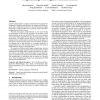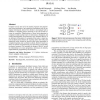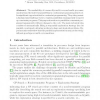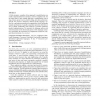118
click to vote
POPL
2010
ACM
15 years 16 days ago
2010
ACM
S-NET is a declarative coordination language and component technology aimed at modern multi-core/many-core architectures and systems-on-chip. It builds on the concept of stream pr...
118
click to vote
POPL
2010
ACM
15 years 2 months ago
2010
ACM
In this paper, we explore the potential of the theory of nested words for partial correctness proofs of recursive programs. Our conceptual contribution is a simple framework that ...
140
click to vote
POPL
2010
ACM
15 years 4 months ago
2010
ACM
Angelic nondeterminism can play an important role in program development. It simplifies specifications, for example in deriving programs with a refinement calculus; it is the form...
127
click to vote
POPL
2010
ACM
15 years 4 months ago
2010
ACM
Computer science has served to insulate programs and programmers from knowledge of the underlying mechanisms used to manipulate information, however this fiction is increasingly h...
112
click to vote
POPL
2010
ACM
15 years 7 months ago
2010
ACM
The availability of commodity multi-core and multi-processor machinesandtheinherentparallelisminconstraintprogrammingsearchoffer significant opportunities for constraint programmi...
122
click to vote
POPL
2010
ACM
15 years 9 months ago
2010
ACM
A fully automatic, compiler-driven approach to parallelisation can result in unpredictable time and space costs for compiled code. On the other hand, a fully manual approach to pa...
122
click to vote
POPL
2010
ACM
15 years 9 months ago
2010
ACM
Message-passing is an attractive thread coordination mechanism because it cleanly delineates points in an execution when threads communicate, and unifies synchronization and comm...
112
Voted
POPL
2010
ACM
15 years 9 months ago
2010
ACM
We propose a programming paradigm called compress-and-conquer (CC) that leads to optimal performance on multicore platforms. Given a multicore system of p cores and a problem of s...
POPL
2010
ACM
15 years 9 months ago
2010
ACM





